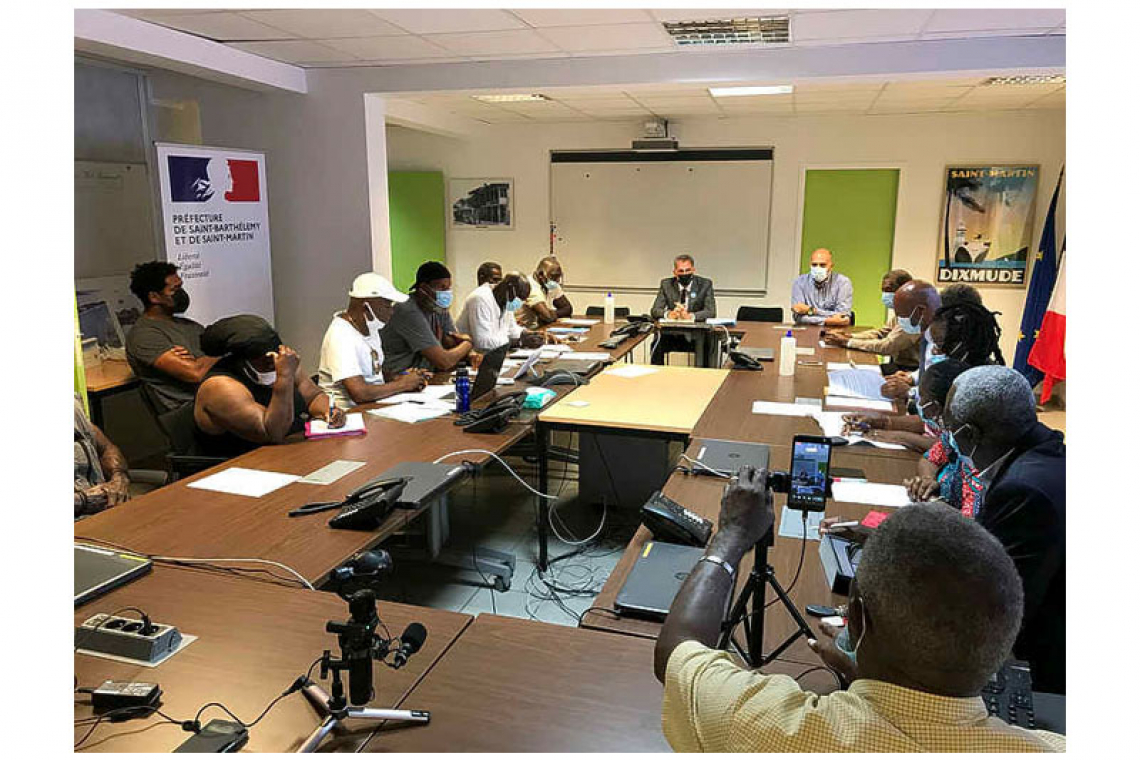The meeting in progress in the Préfecture on Wednesday between the collectives, Préfet Serge Gouteyron, Senator Annick Pétrus, President Gibbs and Vice-Presidents. (Robert Luckock photo)
MARIGOT—Third Vice-President of the Collectivité responsible for social affairs, Sofia Carti-Codrington, said Wednesday that possibly “hundreds” of stateless citizens from all districts including French Quarter, and some from the Dutch side, exist in the shadows. They are not widely recognised by authorities but are very much part of the social problems and poverty in St. Martin, she noted.
“These are children of migrants who have no identity at all, and nobody is talking about this. These people cannot enrol in a training course because they have no ID or passport; they have somehow fallen in between the cracks and can neither work nor travel. The State which is in charge of immigration has to regulate this anomaly otherwise you cannot solve the social crisis. These people are also making children so you can imagine they are also stateless.”
She cited an example of a girl who was born in St. Martin and her mother was deported leaving the daughter stateless. And recently a young man died from COVID-19. He was flown out by plane for the medical emergency and came back by boat in a coffin.
“We can fix all we want in these two districts but if we don’t address this stateless question, we’re not fixing anything,” she cautioned
Carti was speaking at the meeting held in the Préfecture Wednesday where the collectives’ negotiating delegation presented their counter proposals to the protocol signed weeks ago by the préfet and President Gibbs.
She said quite a lot of the subjects mentioned in the counter proposals of the collectives, are subjects that the Collectivité is already working on. The social issues relate more to the two districts of Sandy Ground as these districts are designated priority areas. She agreed certain public services are lacking in the two districts.
According to Carti the former post office in French Quarter was not destroyed by Hurricane Irma but It had been broken into. It is a public/private entity. The mail delivery part is the responsibility of the State but the banking and other financial aspects of the post office are private.
“The clientele of French Quarter is not attractive to the Post Office powers-that-be because the people mostly use it just to take out money, but we (the Collectivité) insisted on having a branch in French Quarter, mainly for the convenience of the elderly,” Carti explained. “So, we have been having a battle to get what we want. And what has made it harder is when the director changes and we have to start negotiating all over again.”
Senator Annick Pétrus addressed the concerns about education. Echoing Louis Mussington’s comments on education the day before, Pétrus acknowledged the failings in the education system. “The figures don’t lie, there is a problem with education in St. Martin,” she said.
She disclosed however that two articles in the organic law permit St. Martin to choose an education system more adapted to St. Martin and to make modifications to the teaching methods and these changes are being discussed at the legislative level. Teachers also need to be trained to teach St. Martin children and the Collectivité has the financing for this training. There is also a shortage of teachers in St. Martin as many are working in France and willing to come back to the island. She noted the Minister of Education supported this in correspondence that Petrus shared in the meeting.
“The problem with this is that the teachers have to go through Guadeloupe first because St. Martin doesn’t have an academy (Rectorat) here. So, it’s a double difficulty for them to get back, but I am working on this problem.”
Collective spokesman Lenny Mussington said the collectives would remain “very vigilant’ on the outcome of Petrus’s lobbying for this change.
The collectives had produced a long list of counter proposals and concerns. These included training, education, the lack of cultural activities and sports facilities, financial aid for impoverished persons, proposals for the natural risk prevention plan PPRN, 50 pas géométriques, and more specific demands for the two districts. This took some time to present.
Despite the occasional heated exchange, notably between the préfet and Cédrick André, the meeting was moving in a constructive direction with the elected officials responding to some of the counter proposals and explaining what projects were in progress, and financing aspects.
Unfortunately, time ran out after three hours as the préfet had to leave for another engagement. The meeting resumes again with the collectives on Friday at the Collectivité.







